Nuclear Talks
- By AFP
Iran Can Produce Fissile Material For Bomb In 'Weeks,' U.S. Says
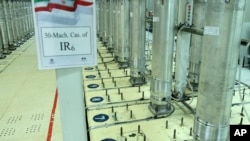
Iran is capable of producing fissile material for use in a nuclear weapon within "one or two weeks," U.S. Secretary of State Antony Blinken said on July 19. Despite comments by Iran's new president, Masud Pezeshkian, who has said he favors reviving the 2015 nuclear deal between Iran and global powers, Blinken said the United States had seen indications in recent weeks that Iran has moved forward with its nuclear program. Blinken blamed the collapse of the nuclear deal in 2018 for the acceleration in Iran's capabilities. "Instead of being at least a year away from having the breakout capacity of producing fissile material for a nuclear weapon, [Iran] is now probably one or two weeks away from doing that," Blinken said at a security forum in Colorado.
U.S. Slaps Fresh Sanctions On Iranian Entities, Vessels Over Nuclear Escalations
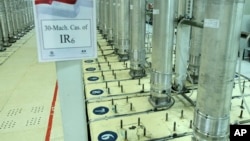
The United States on June 27 issued fresh sanctions against Iran in response to Tehran further expanding its nuclear program, U.S. Secretary of State Antony Blinken said in a statement.
"Over the past month, Iran has announced steps to further expand its nuclear program in ways that have no credible peaceful purpose," Blinken said. "We remain committed to never letting Iran obtain a nuclear weapon, and we are prepared to use all elements of national power to ensure that outcome."
Subscribe To RFE/RL's 'The Rundown'
Get a curated digest of all our essential news, features, and analysis, plus our best visual journalism, in your inbox every day. The Rundown keeps you up-to-date on Russia's ongoing invasion of Ukraine and developments across our vast coverage area. Sign up here.
The new sanctions take aim at three companies based in the United Arab Emirates and 11 vessels used in the export of Iranian petroleum or petrochemical products, Blinken said.
Earlier this month, the Group of Seven nations warned Iran against advancing its nuclear enrichment program and said it would be ready to impose new measures if Tehran were to transfer ballistic missiles to Russia.
Iran rebuked the statement, calling on the G7 to distance itself from "destructive policies of the past."
Blinken in his June 27 announcement also cited the G7 statement, saying Iran “must cease its escalations with regard to its nuclear program as well as its other destabilizing actions.”
Blinken said Iran’s actions to increase its enrichment capacity are all the more concerning in light of statements by Iranian officials suggesting potential changes to Iran’s nuclear doctrine.
Iran says its nuclear program is for peaceful civilian purposes, but government officials caused alarm recently by saying it could change its "nuclear doctrine" if it is attacked or its existence is threatened by Israel.
Blinken also said Tehran’s “continued failure to cooperate" with the International Atomic Energy Agency (IAEA) was worrisome. The board of governors of the IAEA on June 5 passed a resolution calling on Iran to step up cooperation with the UN nuclear watchdog and reverse its decision to bar inspectors.
The Iranian Foreign Ministry slammed the vote, describing it as a “political and unconstructive” move.
With reporting by Reuters
Iran Slams 'Unconstructive' Resolution By Nuclear Watchdog, Vows 'No Retreat'
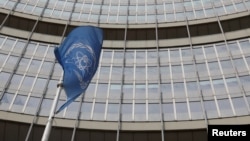
Iran has criticized a resolution by the board of governors of the International Atomic Energy Agency (IAEA) calling on Tehran to step up its cooperation with the UN nuclear watchdog.
The IAEA’s 35-nation board on June 5 voted 20-2, with 12 abstentions, to adopt the censure resolution tabled by Britain, France, and Germany -- the three Western European nations that are party to the 2015 nuclear deal with Iran and are known as the E3.
In a statement, the Iranian Foreign Ministry said it “strongly condemns” the resolution, which it described as a “political and unconstructive” move.
It added that Tehran is “committed to continue its technical cooperation” with the watchdog under the Nuclear Non-Proliferation Treaty (NPT) and the Safeguards Agreement with the IAEA.
Ahead of the vote, Iran had warned that it would respond to the censure resolution.
Behruz Kamalvandi, a spokesman for the Atomic Energy Organization of Iran (AEOI), said after the adoption of the resolution that Tehran had “started taking steps” in response to the vote. He did not elaborate.
“Past experience should have proved to them [the West] that Iran does not retreat from its inalienable rights in the face of political pressure,” he said.
Nour News, an Iranian outlet affiliated with Ali Shamkhani, senior political adviser to Iran’s supreme leader, warned on June 6 that applying pressure on Tehran would only encourage it to expand its nuclear program.
Meanwhile, the Kayhan newspaper, whose chief editor is appointed by the supreme leader, on June 6 demanded the expulsion of all IAEA inspectors from Iran. It also alleged that the resolution was meant to influence Iran’s upcoming presidential election by forcing voters to elect a government willing to negotiate with the West.
Despite its adoption, the resolution did not receive as many votes in favor as the last two resolutions. A June 2022 resolution was adopted 30-2, while a November 2022 resolution was passed 26-2.
Iran responded to the June 2022 resolution by removing IAEA cameras and monitoring equipment from several nuclear sites. In reaction to the November 2022 censure, Tehran started to enrich uranium to 60 percent purity at a second site, the Fordo plant.
In September 2023, despite there being no resolution against Iran, the Islamic republic moved to bar several experienced UN inspectors from monitoring its equipment.
The new resolution calls on Iran to reinstate the veteran inspectors.
Iran insists that it has been cooperative with the IAEA, but the agency’s director-general, Rafael Grossi, maintains that Tehran has failed to provide “technically credible” explanations for traces of uranium found in two old but undeclared sites.
Damon Golriz, a lecturer at The Hague University of Applied Sciences, told RFE/RL’s Radio Farda that the resolution may be a step by European powers toward “taking a political decision” to trigger a “snapback” of UN Security Council (UNSC) sanctions against Iran.
The “snapback” mechanism is outlined in UNSC Resolution 2231, which enshrined the nuclear deal between Iran and world powers. However, the option to reimpose the sanctions expires in October 2025.
“With the activation of the ‘snapback’ mechanism, we go back to how things were 15 years ago, when six UN resolutions obliged the world to put Iran under pressure,” Golriz said.
Written by Kian Sharifi based on reporting by RFE/RL’s Radio Farda and AP
IAEA Calls For Iran To Increase Cooperation, End Ban On Inspectors
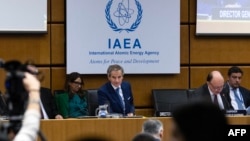
The board of governors of the International Atomic Energy Agency (IAEA) on June 5 approved a resolution calling on Iran to step up cooperation with the IAEA and to reconsider its decision to bar the agency's inspectors.
The resolution, proposed by Britain, France, and Germany, passed 20-2 with 12 abstentions, diplomats said. The two no votes were cast by Russia and China.
Iranian state TV said passage of the resolution "was hasty and unwise, and it will undoubtedly have a detrimental impact on the process of diplomatic engagement and constructive cooperation" between Iran and the opposite parties.
The resolution follows another passed 18 months ago that ordered Iran to immediately respond to questions from IAEA inspectors about the origin of uranium particles found at its undeclared sites.
Although the number of sites under inspection has decreased from three to two, the IAEA says that Iran has not yet given the agency a convincing explanation about the origin of these uranium particles.
Britain, France, and Germany said in a statement to the Board of Governors it should have held Iran accountable for its legal obligations long ago.
The statement emphasizes that "Iran must urgently, fully, and unambiguously cooperate with the agency."
Since the approval of the previous resolution, the list of issues faced by the IAEA in Iran has grown, and the new resolution requires Iran to resolve these numerous problems.
At the end of last summer, Tehran barred the participation of many senior IAEA experts in the inspection group, which IAEA Director-General Rafael Grossi said was "disproportionate and unprecedented" and a "serious blow" to the UN nuclear watchdog in carrying out its mission.
The board "calls on Iran to reverse its withdrawal of the designations of several experienced agency inspectors which is essential to fully allow the agency to conduct its verification activities in Iran effectively," the resolution said.
The resolution called the presence of these uranium-enrichment experts in inspections of Iran's nuclear activities "vital."
Grossi traveled to Iran last month hoping to break a deadlock on the probe into the uranium particles, address the issue of the barred inspectors, and expand IAEA monitoring to parts of Iran's nuclear program that were covered under a 2015 deal with major powers.
The deal fell apart after Iran responded to the U.S. withdrawal from the deal in 2018 by abandoning its provisions, including IAEA monitoring of activities such as the production of parts for centrifuges, the machines that enrich uranium.
The agency currently does not know how many Iran has or where they are.
With reporting by Reuters
- By AP
Iran's Stockpile Of Enriched Uranium Continues To Increase, Says UN Nuclear Watchdog
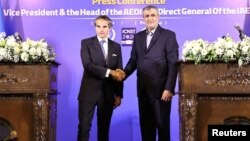
Iran has further increased its stockpile of uranium enriched to near weapons-grade levels, according to a confidential May 27 report by the International Atomic Energy Agency (IAEA). Iran's stockpile of uranium enriched to 60 percent purity is now 142.1 kilograms -- an increase of 20.6 kilograms since the watchdog's last report in February. The IAEA also said that the deaths of Iran's president and foreign minister in a helicopter crash on May 19 have forced a pause in the UN nuclear watchdog's talks with Tehran over improving cooperation.
- By Kian Sharifi
EU Urges Iran To 'Reverse Nuclear Trajectory' As Tehran Threatens To Cross Threshold

The European Union has joined the United States and the International Atomic Energy Agency (IAEA) in urging Iran to abandon suggestions that it might develop nuclear weapons.
"We continue to call Iran to reverse its nuclear trajectory and show concrete steps, such as urgently improve cooperation with the IAEA," EU spokesman Peter Stano told RFE/RL in written comments on May 16.
The Islamic republic has long claimed that its nuclear program is strictly for civilian purposes, but a growing number of officials in recent weeks have openly suggested that Iran might review its nuclear doctrine if it deems it necessary.
A landmark deal known as the Joint Comprehensive Plan of Action (JCPOA) between Iran and world powers in 2015 restricted Tehran's nuclear program in exchange for relief from sanctions.
However, Iran expanded its program and restricted IAEA inspections of its nuclear sites after then-President Donald Trump withdrew the United States from the deal and reimposed sanctions in 2018.
The EU, which is the coordinator of the JCPOA's Joint Commission, mediated several rounds of indirect talks between Tehran and Washington from 2021 to 2022.
The 27-member bloc presented a final draft of an agreement to revive the deal in August 2022, but talks broke down soon after as Tehran and Washington accused each other of making excessive demands.
"Our goal has always been to stop Iran from acquiring nuclear weapons, through a diplomatic solution," Stano said, adding that the EU's foreign policy chief, Josep Borrell, and his team continue efforts to revive the Iran deal.
Iran has particularly upped the rhetoric since last month, when it launched an unprecedented missile and drone attack against its archfoe Israel in response to a deadly air strike on its embassy compound in Syria that killed several members of the Islamic Revolutionary Guards Corps (IRGC).
An IRGC general at the time warned that an attack on Iran's nuclear sites could lead to a rethinking of its policy on nuclear weapons.
Kamal Kharazi, a senior adviser to Supreme Leader Ali Khamenei and a former foreign minister, repeated the threat earlier this week.
"We do not want nuclear weapons and the supreme leader's fatwa is to that effect. But if the enemy threatens you, what do you do?" he said.
The fatwa refers to a religious decree by Khamenei in which he said the Islamic republic considers the use of nuclear weapons to be "haram" and Iran would not pursue one.
The fatwa has long been cited by the Iranian authorities as evidence that Iran would never weaponize its nuclear program. Experts, however, question how effective of a barrier the fatwa really is.
Farzan Sabet, a senior research associate at the Geneva Graduate Institute, said, "The nuclear fatwa does not pose an insurmountable religious or legal obstacle inside Iran for the system there to pursue nuclear weapons or potentially build them."
Despite the public comments by Iranian officials, the Foreign Ministry has insisted that there has been no change in the country's nuclear doctrine.
Stano said that it "is imperative to show utmost restraint" given the heightened tensions in the Middle East.
"Further escalation in the region -- also in the form of statements about the nuclear posture, even if not reflecting the official position of the country -- is in no one's interest," he added.
In response to in Iran's new rhetoric, the United States has said it "will not allow" Tehran to obtain nuclear weapons.
Separately, IAEA Director-General Rafael Grossi has called on Iran to "stop" suggestions that it might review its nuclear posture.
- By Kian Sharifi
Going Nuclear: Iran's New Rhetorical Deterrence
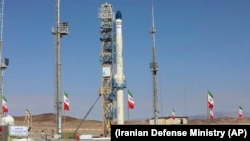
Acquiring nuclear weapons has long been a taboo topic in Iran, where the country's supreme leader has declared them un-Islamic.
But a growing number of Iranian officials in recent weeks have openly suggested that the Islamic republic could weaponize its nuclear program, which Tehran has long claimed is strictly for civilian purposes.
The change in rhetoric has coincided with Tehran's growing hostilities with Israel. Last month, Israel launched an attack on Iran in response to Tehran's unprecedented missile and drone assault on its archfoe.
Experts say Iran's growing threats to build nuclear weapons is worrying, although they maintain that the statements are likely geared toward deterring another attack on Iranian soil.
Eric Brewer, deputy vice president of the Washington-based Nuclear Threat Initiative, said the Iranian threats appeared to be "conditional."
"I do think that if Israel or the United States carried out an attack on Iran's nuclear program, there is a very good chance that Tehran would in fact decide to build nuclear weapons," he said.
Real Or Rhetoric?
Kamal Kharazi, a former foreign minister and current adviser to Supreme Leader Ayatollah Ali Khamenei, warned on May 13 that if Israel threatens Iran, "we might review our nuclear doctrine."
"We do not want nuclear weapons and the supreme leader's fatwa is to that effect. But if the enemy threatens you, what do you do?" he said.
Days earlier, in an interview with Al-Jazeera, Kharazi said Iran "has the capacity to produce a bomb," though the country had not taken the actual step of making one.
Just before Israel's April 19 strike on Iran, a commander of the Islamic Revolutionary Guards Corps warned that an attack that targeted Iranian nuclear facilities would prompt a reciprocal attack on Israel and could lead to a rethinking of Iran's stance on nuclear weapons.
Brewer said what lent the threats "a degree of credibility" is that Iran's nuclear program is far more advanced today than it was in the past.
A landmark deal with world powers in 2015 restricted Iran's nuclear program in exchange for sanctions relief. But then-President Donald Trump withdrew the United States from the agreement and reimposed sanctions in 2018, leading Tehran to accelerate its uranium enrichment and limit international inspections of its nuclear sites.
Farzan Sabet, a senior research associate at the Geneva Graduate Institute, says failed international efforts to revive the nuclear accord could be behind Tehran's recent threats to build nuclear weapons.
Another reason, he said, could be to “deter the current or a future U.S. administration from undertaking another ‘maximum pressure’-style economic and military campaign against Iran.”
Fatwa Not An Obstacle
In 2010, Khamenei issued a fatwa, or religious decree, saying that Iran considers the use of nuclear weapons to be "haram" and that the country would not pursue one.
The fatwa has been cited as evidence by Iranian officials that the Islamic republic does not seek nuclear weapons.
But Brewer said Khamenei's fatwa was "not a meaningful barrier to Iran building the bomb."
"Iran could in theory do most of the work on a weapon with the fatwa in place and then Khamenei could rescind it at the last minute," he added.
Despite the public comments by Iranian officials, the Foreign Ministry has insisted that there has been no change in the country's nuclear doctrine.
Sabet said this dual messaging could "reflect a debate inside the system in Iran, in which the balance of power or consensus until recently did not favor building and deploying nuclear weapons, but which may be shifting."
Some Iranian media reports have said that the country has enough enriched uranium to produce 10 nuclear bombs.
Brewer says U.S. estimates suggest that it would take Iran about two weeks to produce enough weapons-grade uranium to make a bomb. But he says manufacturing a deliverable nuclear device could take months, or even more than a year.
Senior Iranian Official Threatens Change In Nuclear Doctrine
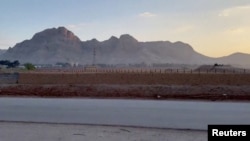
A senior Iranian official has issued a stark warning that Tehran might change its nuclear doctrine and begin to build nuclear bombs if the nation's existence is threatened.
Kamal Kharrazi, head of Iran’s Strategic Council on Foreign Relations and senior adviser to Supreme Leader Ayatollah Ali Khamenei, said in an interview aired on Al-Jazeera Arabic that Iran "has the capacity to produce a bomb," though the country has not taken the actual step of making one.
"Two years ago in an interview with Al-Jazeera, I announced that Iran has the capacity to produce a nuclear bomb. That capacity still exists today, but we have no intention of producing a nuclear bomb. However, if the existence of Iran is threatened, we will have to change our nuclear doctrine," he said.
The comments come at a time of escalating tensions between Iran and Israel, further complicated by the international community's concern over Iran's nuclear ambitions. The Islamic republic has repeatedly claimed that its nuclear program is for civilian purposes, despite possessing the technical capabilities for weaponization.
A nuclear deal in 2015 lifted U.S. sanctions against Tehran, but in 2018, then-U.S. President Donald Trump left the agreement and Washington has since ratcheted up measures against Iran that have choked the country's economy.
Efforts to revive the deal have failed, and Tehran has violated terms of the pact by producing uranium with a higher enrichment threshold.
In March, Bloomberg News quoted a senior U.S. Defense Department official as saying Iran was less than 12 days away from obtaining the fissile material necessary to produce an atomic bomb.
The threat of a shift in doctrine follows an incident last month when Israel is said to have targeted a radar system at a base near the city of Isfahan.
The attack followed an incident on April 13, when Iran retaliated against an Israeli attack on its consulate in Damascus that claimed the lives of seven senior officers from the Quds Force of Iran's Islamic Revolutionary Guards Corps. Iran launched hundreds of drones, ballistic missiles, and cruise missiles at Israel, though almost all failed to hit targets inside Israel.
After Khamenei issued a fatwa, or religious ruling, against nuclear weapons in 2005, officials were adamant that Tehran’s nuclear program was strictly for civilian purposes. But the rhetoric has shifted in recent years.
In the interview, Kharrazi also made reference to potential reactions to any attack on Iran’s nuclear facilities.
"If they want to strike at Iran's nuclear capabilities, it could naturally lead to a change in Iran's nuclear doctrine," he said.
Rafael Grossi, the head of the International Atomic Energy Agency, warned earlier this month that Iran is only weeks away from having enough enriched uranium to produce a nuclear bomb. Grossi has criticized Tehran’s cooperation with the agency as "unacceptable" and called for a significant shift in Iran's nuclear policy.
Kharrazi also hinted at the possibility of Iran withdrawing from the Nuclear Non-Proliferation Treaty (NPT) and potentially moving toward developing nuclear weapons. Iran had previously warned it would leave the NPT if its regime felt threatened.
Written by Ardeshir Tayebi based on an original story in Persian by RFE/RL's Radio Farda
- By AFP
IAEA Chief Says Cooperation From Iran 'Completely Unsatisfactory'
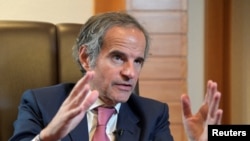
UN atomic watchdog chief Rafael Grossi said on May 7 that cooperation from Iran at present was "completely unsatisfactory" after returning from Tehran, where he urged the country to adopt "concrete" measures to address concerns on its nuclear program. "We have to be moving on.... The present state is completely unsatisfactory for me. We are almost at an impasse...and this needs to be changed," the chief of the International Atomic Energy Agency (IAEA) told reporters at the Vienna airport.
- By AFP
IAEA Chief In Iran As Concern Grows Over Nuclear Activity

UN atomic watchdog chief Rafael Grossi arrived in Iran on May 6, where he is expected to speak at a conference and meet officials for talks on Tehran's nuclear program. The visit comes at a time of heightened regional tensions and with the International Atomic Energy Agency (IAEA) criticizing Iran for lack of cooperation on inspections and other outstanding issues. Grossi is scheduled to meet Iran's Foreign Minister Hossein Amir-Abdollahian, as well as the Islamic republic's nuclear chief, Mohammad Eslami.
- By dpa
Iran Says UN Nuclear Watchdog Chief Will Visit Tehran
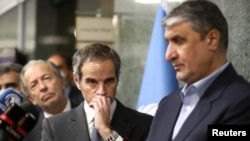
The head of the International Atomic Energy Agency (IAEA), Rafael Grossi, will shortly be travelling to Tehran to resume nuclear talks with the Iranian side, a top Iranian official said on April 17. "We have good cooperation with the IAEA and the IAEA chief will also come to Tehran soon to continue the bilateral talks and update them, so to speak," Iran's nuclear boss, Mohammad Eslami, said, according to the Iranian news agency IRNA. Grossi said in an interview with CNN on April 16 that he was "considering" visiting Tehran.
- By AP
Head Of UN Nuclear Watchdog Says Iran Is 'Not Entirely Transparent' About Its Atomic Program
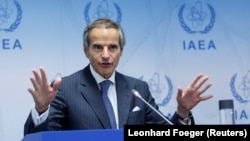
The head of the United Nations' nuclear watchdog warned on February 13 that Iran is “not entirely transparent” regarding its atomic program, particularly after an official who once led Tehran's program announced that the Islamic Republic has all the pieces for a weapon “in our hands.” Speaking at the World Governments Summit in Dubai, just across the Persian Gulf, Rafael Grossi, the director-general of the International Atomic Energy Agency, alluded to remarks made this weekend by Ali Akbar Salehi. Since the collapse of a 2015 nuclear deal it struck with world powers, Iran has pursued nuclear enrichment just below weapons-grade levels.
Iran Announces Successful Launch Of Three Satellites
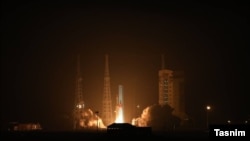
Iran announced on January 28 that it successfully launched three satellites into space, the latest for a program that the West says improves Tehran's ballistic missiles. The state-run IRNA news agency said the launch also saw the successful use of Iran's Simorgh rocket, which has had multiple failures in the past. State TV named the launched satellites as Mahda, Kayhan-2, and Hatef-1. It described the Mahda as a research satellite, while the Kayhan and the Hatef were nanosatellites focused on global positioning and communication, respectively. To read the original story by RFE/RL's Radio Farda, click here.
- By Reuters
France, Germany, U.K., U.S., Condemn Iran's Increase In Uranium Enrichment

France, Germany, Britain, and the United States on December 28 condemned Iran's increase in production of highly enriched uranium following an International Atomic Energy Agency (IAEA) report earlier this week. "We urge Iran to immediately reverse these steps and de-escalate its nuclear program," the countries said in a joint statement. "We remain committed to a diplomatic solution and reaffirm our determination that Iran must never develop a nuclear weapon," they said. The IAEA report said Iran had "increased its production of highly enriched uranium, reversing a previous output reduction from mid-2023." (Reuters)
- By dpa
Iran Rejects IAEA Report On Increased Enriched-Uranium Output

The head of Iran's Atomic Energy Organization has rejected a report by the International Atomic Energy Agency (IAEA) that production of highly enriched uranium has been ramped up sharply. "We are pursuing our current activities within the rules framework," Mohammad Eslami said, the Iran Students' News Agency (ISNA) reported on December 27. IAEA chief Rafael Grossi informed the organization's member states about the increased activity on December 26. An international deal from 2015 limits Iran to only 4 percent enrichment, but Iran began violating the terms in 2018 after the United States pulled out of the deal.

